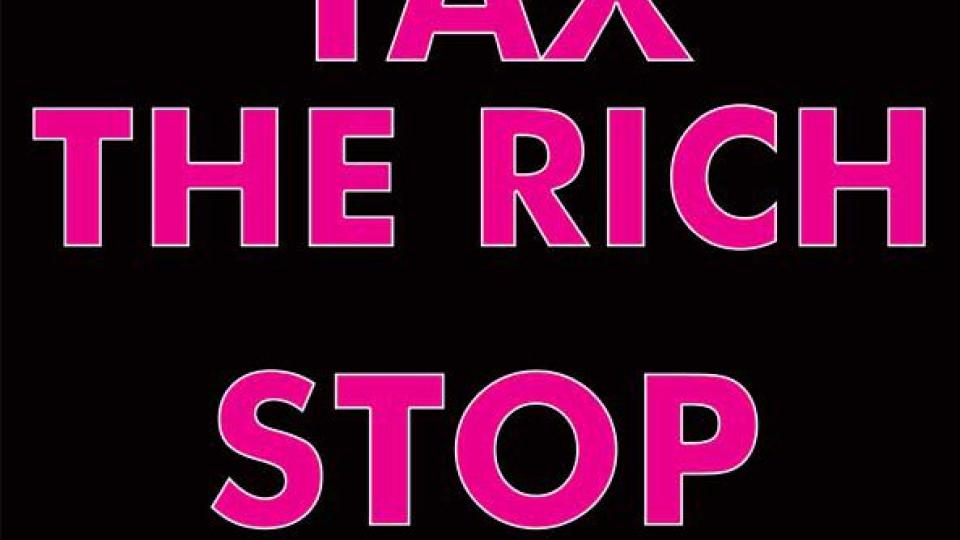Tax the rich, stop the cuts!

It is utterly galling to hear the leader of the federal Labor opposition criticising the government for proposing a “new tax” in the form of a modest and temporary “deficit levy” on taxpayers in the highest income bracket.
“Tony Abbott, Australians do not want your tax increases full stop,” Labor leader Bill Shorten said at a May 7 press conference.
“Tony Abbott, Australians do not want your broken promises. They know that before the last election you staked your reputation on being a prime minister who wouldn’t break promises. You made a virtue of this.”
Pointing out that Abbott is going back on his “no new taxes” promise is good. So is mentioning that the purpose of this levy is simply to sugar-coat the much larger pain his government wants to inflict on the poorer sections of the community through cuts to pensions, Medicare, education and public sector jobs.
But it is totally wrong to give any credibility to the right-wing, “no new tax” mantra.
A pro-people government in Australia should introduce new taxes on the rich. The richest corporations and richest individuals have been given billions of dollars in tax cuts and public subsidies by Liberal and Labor governments over the past few decades and this is the single biggest cause of the current budget deficit.
In its recently released report Auditing the auditors: The People's Commission of Audit, progressive think-tank The Australia Institute said: “At just 26.5% (which combines Commonwealth and state taxes) Australia is the fourth lowest taxed country. In 2012, total Commonwealth tax was just 22.6% of GDP. Most OECD countries have tax to GDP ratios of 30% or more.
“Despite having a comparatively low tax rate, Australia governments have actually made tax cuts over the past decade. The last budget of the Howard government and 2007 election promises from both major parties resulted in large income tax cuts under the ALP Governments (2007-13).
“In fact, the Australia Institute has estimated that the cumulative cost of the tax cuts introduced since 2005 are about $170 billion, with the top 10% of income earners receiving more of that $170 billion than the bottom 80% combined.”
The top bracket income tax rate has not only been reduced, but the proportion of income earners to which it applies has been reduced, the Australia Institute reported.
“For example, since 2001 the top tax bracket has been increased from $60,000 to $180,000. Over the same period the proportion of taxpayers in the top tax bracket has fallen from 13% to 3% and the top tax rate itself has been cut from 47% to 45%.”
While kicking off the huge tax cuts for the rich, the Howard government introduced the Goods and Service Tax (GST) in 2000. This tax imposes more burden (relative to resources) on the poor than on the rich. Those on fixed incomes, unemployed or living on the age pension, and those who do not pay income tax, pay the same GST as a billionaire.
The ALP opposed the introduction of the GST, but when in government, did not repeal it. Now the Business Council of Australia — which represents the 100 largest corporations in Australia and effectively ran the National Commission of Audit — is campaigning to raise the GST.
The Socialist Alliance’s policy is to repeal the GST and tax the rich. A government for the majority of people should begin by making the income tax rate truly progressive, with the highest brackets raised immediately from 47% to 60%. The company tax rate, now just 30%, should immediately be returned back to 49%, where it was until 1988.
In addition, we call for the implementation of a serious mining tax without the thousands of loopholes of the proposed Rudd government mining tax and the watered down Gillard government farce of a mining tax.
Another Australia Institute report, Corporate Power in Australia, found that: “In 2012 the mining industry made 21.6% of all profit in Australia despite employing only 2.3% of the workforce, and despite the fact that the mining industry is estimated to be 83% foreign owned.
“The mining industry regularly claims that ‘ordinary mums and dads’ are sharing in the enormous profits that are generated by selling the minerals owned by Australian citizens for record high prices. While it’s true that ‘mums and dads’ with large superannuation balances get some benefit from the remaining 17% of profit, it is also clear that one particular mother, Gina Rinehart, receives a larger than average slice of that remaining 17%.”
Last year, mining profits grew a further 11%, says the Australian Bureau of Statistics, outstripping all other sectors. Yet, when ABS figures are compared with figures from the Australian Taxation Office, the Australia Institute found mining pays the lowest rate of tax on profits of any industry. This is due primarily to the generous tax concessions the mining industry has been granted.
The Abbott government has increased the already huge $4.5-billion-a-year federal government subsidies to the mining industry by 12.5%. On top of this, the mining companies get more subsidies from state governments, including getting the minerals at 10% the market value because of low royalties.
The mining profit tax proposed by Kevin Rudd was a mere 40% and we all saw how the mining companies reacted. However, in Norway, a 78% tax on revenue from petroleum and gas extracts up to 90% of gross profits on that sector. At the very least, a pro-people government should match that.